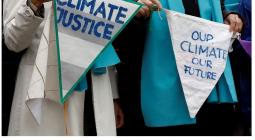The Guardian view on Europe’s imperilled green deal: time to outflank the radical right

Following the European parliament elections of 2019, the newly elected president of the European Commission, Ursula von der Leyen, told MEPs: “If there is one area where the world needs our leadership, it is on protecting our climate … We do not have a moment to waste. The faster Europe moves, the greater the advantage will be for our citizens, our competitiveness and our prosperity.”
Five years on, all that remains true, and the urgency of taking decisive action is even greater. Last week, the United Nations general secretary, António Guterres, warned that the world faced “climate crunch time”, referring to new data revealing that the crucial 1.5C threshold for global heating was breached over the past year. But the politics of climate action in Europe is lurching in the wrong direction at alarming speed.
Commentary on last weekend’s European polls has focused on the rise of the radical right, most spectacularly seen in France. But it was also a difficult night for green parties, who saw their vote share plummet by more than a quarter. The French Greens barely made it over the 5% threshold required to send MEPs to Strasbourg. In Germany, where the Greens form part of the coalition government, the party’s vote was almost halved to 12%. Taken together, these twin trajectories should set alarm bells ringing in relation to Europe’s green deal, which is about to enter into its most challenging and politically delicate phase.
The new European Commission, which will most probably be led once again by Ms von der Leyen, will be responsible for legislating a path to a 90% reduction of greenhouse gas emissions by 2040. This will involve transformation in areas such as housing and transport, and have a direct impact on everyday lives. With the recent wave of farmers’ protests fresh in the memory, the palpable risk is that already watered-down measures will be further diluted, for fear of a popular backlash.
From Georgia Meloni in Italy to Marine Le Pen in France and Geert Wilders in the Netherlands, the leaders of the radical right will continue to use their growing influence to foment such a revolt. Ms Meloni has, for example, presented herself as a champion of the less well-off by resisting the idea of EU-wide standards on energy efficiency in homes, and dismissed a 2035 ban on new petrol and diesel vehicles as “ideological folly”. Meanwhile, in Brussels, Ms von der Leyen’s recent U-turns in relation to reducing agricultural emissions do not inspire confidence.
If the future of Europe’s green deal is to be safeguarded, a step-change is needed. Dealing with enormous competing challenges, such as supporting Ukraine’s resistance to Russia, is eating up bandwidth in Brussels. And although action to mitigate the climate emergency remains a priority for voters across the continent, economic insecurity is at the forefront of their minds. In the context of that anxiety, a false opposition between pro-green and pro-growth policies has begun to gain rhetorical ground.
Such problems will not be overcome by a politics-as-usual approach in Brussels. The combined leverage of progressive forces in the new European parliament remains considerable. It should be used to change the terms of engagement with the radical right and its fellow travellers. A much bigger European budget, combined with joint borrowing to finance gamechanging investment, would allow the green deal to become a visible catalyst for economic growth. It would also allow the necessary levels of support to be offered to families and small businesses navigating the changes to come. The alternative is a Europe that, while paying lip service to net zero targets, reneges on its global responsibilities. As Mr Guterres said, “climate crunch time” has arrived.





